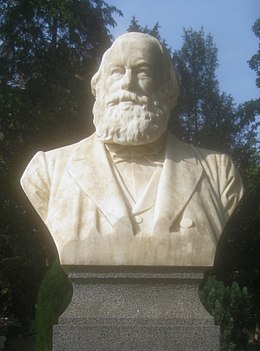Immanuel Faisst

Immanuel Gottlob Friedrich Faißt (born October 13, 1823 in Esslingen am Neckar , † June 5, 1894 in Stuttgart ) was a German composer and co-founder of the Stuttgart University of Music , of which he was director until the end of his life.
Life
Despite his musical talent, which was recognizable at an early age, Faißt, following his father's wish, began studying Protestant theology at the Schönthal seminar and the Tübingen monastery , which ended in 1844 with the first ecclesiastical examination. During his studies he became a member of the Nordland Association . With the help of a scholarship, he was able to start studying church music in Berlin at the Academy of Arts , where he initially met Felix Mendelssohn Bartholdy and otherwise benefited in particular from the organist Carl August Haupt and the theoretician Siegfried Dehn .
In 1846 Faißt moved to Stuttgart, where he initially worked as a piano teacher and in the same year took over the management of an organ school. A major focus of his work was his activity as a conductor with two Stuttgart mixed choirs . The association for classical church music founded by Alois Schmitt , which Faißt directed until 1891, became one of the leading German church music choirs. In the period from 1848 to 1857 Faißt also directed the Stuttgarter Liederkranz . In addition, Faisst received his doctorate in Tübingen in 1849 on a musicological topic .
In 1856 he was appointed professor, and in 1857, together with Sigmund Lebert , Wilhelm Speidel and other musicians, he founded the Stuttgart Music School, today's Stuttgart University of Music and Performing Arts. In 1859 he took over its management, which he held for over three decades until his death.
Because of his successful and highly regarded choral work, Faißt was appointed director of the Württemberg singing festival. In 1865 he was the conductor of the first song festival of the German singer association founded in 1862 in Dresden . He shaped the southern German choral life through his numerous activities as composer, conductor, organizer and judge.
Works
His compositions are in the tradition of Mendelssohn, but his in-depth knowledge of the time before Bach also benefited his compositions. In addition to some instrumental works and songs for a soloist, he composed primarily for choirs, both a cappella and with accompaniment by an orchestra. The better-known pieces include the organ works Introduction and Fugue in D minor and the Sonata in E major, the consolation song to be sung a cappella and the motet I want to sing of the grace of the Lord forever .
In addition, he published several textbooks for music lessons, including a. 1847 the theory of music for future organists and 1880–1882 together with L. Stark the elementary and choral singing school for higher education institutions .
One of his students and colleagues in Stuttgart was the American music theorist Percy Goetschius , whose teaching methods were shaped by Faißt.
literature
- Hermann Fischer : Faißt, Immanuel . In: Allgemeine Deutsche Biographie (ADB). Volume 48, Duncker & Humblot, Leipzig 1904, pp. 485-487.
- Reinhold Sietz: Faisst, Immanuel . In: Friedrich Blume (Ed.): MGG . tape 3 . Bärenreiter Verlag, 1955, Sp. 1735-1737 .
- Helge Dvorak: Biographical Lexicon of the German Burschenschaft. Volume II: Artists. Winter, Heidelberg 2018, ISBN 978-3-8253-6813-5 , pp. 189–190.
Web links
- Sheet music and audio files by Immanuel Faißt in the International Music Score Library Project
- Literature by and about Immanuel Faißt in the catalog of the German National Library
- Immanuel Faißt with Bach Cantatas (English)
- Immanuel Faisst as a composer of organ music on schwaebische-orgelromantik.de
Individual evidence
- ↑ Württemberg quarterly books for regional history. Stuttgart 1920, p. 293.
| personal data | |
|---|---|
| SURNAME | Faisst, Immanuel |
| ALTERNATIVE NAMES | Faißt, Immanuel Gottlob Friedrich (full name) |
| BRIEF DESCRIPTION | German composer and university professor |
| DATE OF BIRTH | October 13, 1823 |
| PLACE OF BIRTH | Esslingen am Neckar |
| DATE OF DEATH | June 5, 1894 |
| Place of death | Stuttgart |